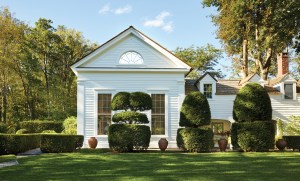Bunny Williams believes she was born to design. The celebrated decorator, author and furnishings designer said she thinks some enter the world with an innate ability to distinguish what looks good and what does not. But she warned that it takes more than having an eye to be successful in design.
“I do think we are born with an eye. All of us in this field, we see, we take in things, but it’s how we train that eye that I think is important,” she told an audience of fellow designers at the recent High Point Market in North Carolina. “When I was writing this book, I was looking back and thinking of how I got started and how important education is, and you educate yourself over and over again.”
That book is “Life in the Garden,” a new coffee table tome filled with photos of the lush gardens surrounding Williams’ Connecticut home. She purchased the house and grounds — which were fairly rundown and overgrown — more than 40 years ago. In the years since, she and her husband, antiques dealer John Rosselli, have brought the home and garden back to flourishing life.

A view of Bunny Williams’ garden and house in Connecticut.
“I think one of the reasons I wanted to buy a house is I wanted a garden,” Williams said. “I was living in an apartment in New York, but I’d grown up in the country, and I wanted to get back to the country.”
Williams was raised on a farm in Charlottesville, Va., where she rode horses and developed an appreciation not only for the land, but also stately Southern homes.
“We lived in the country, but my mother and father both loved houses and loved gardens, and they took me constantly on tours,” she said.
Perhaps most memorable of those tours was a trip to The Greenbrier resort in West Virginia when Williams was a teen. As she wandered the newly opened hotel, the decor and furnishings unlocked an unexpected passion for design.
“The famous American decorator Dorothy Draper had decorated the hotel, and I went into this amazing place with these bright colors,” she said. “My family was fairly conservative, so frankly, I’d never seen anything like this in my life. And I loved every inch of it.”
The bold use of color and variety that epitomizes Draper’s Greenbrier design scheme reoccurs in the gardens in Williams’ book. Set against the verdant greens of all manner of grasses, stately boxwoods, delicate ferns and curling ivy, the deep crimson of poppies, bubblegum pink snapdragons, golden sunflowers and purple orchids create a tapestry of color that changes with the season.
Just as with her interiors projects and furnishings collections, Williams drew inspiration from her travels to help shape her gardens.

Bunny Williams believes the best gardens have a variety of heights, seen here in her garden.
“John and I would go to France [and] to Italy, and we would not only go shopping, but we’d go look at gardens,” she said. “I went to gardens in Normandy. Obviously you go to Sissinghurst, the most extraordinary garden, I think, in the world. And you realize that these gardens had a plan. They were beautifully laid out. All I was interested in were the plants, but I realized that my garden needed structure.”
Williams outlines the structure of her gardens in the book, from the primly laid out parterre garden to the wild, unfettered growth of native plants in the woodland one. And she explains that just as in an interior room, a garden needs differentiation in height and spacing.
“And in a garden, just like in your house, you’ve got to go from one room to another. You have hallways, you have doors, there’s a flow.”
Williams collects gardening accoutrements, storing and displaying them in outbuildings such as her greenhouse and potting shed.

Bunny Williams collects garden accoutrements, such as old watering cans, seen here.
“I love old watering cans,” she said. “I’m always buying baskets, rakes, tools. I just think they look so beautiful. When I see wonderful terracotta pots, mossy terracotta pots, I can’t resist them. But we do use them.”
Williams brings elements of the outdoors inside as well. Tablescapes get a lively boost from centerpieces crafted with colorful vegetables from the garden. Single sunflowers in a bud vase add interest to the mantle, and during the holidays, Williams drapes her interiors in evergreens grown specifically for decorative use.
“Whether it’s coleus in urns or morning glories growing in a terracotta pot, all these things add so much to a garden and a property and a house,” she said.
Along with her book, Williams introduced new designs from her Bunny Williams Home collection with Wesley Hall at High Point Market. The line includes an assortment of seating and dining options, as well as beds and accent tables, which Williams said inspired the launch of the partnership with Wesley Hall.
“I couldn’t find enough drink tables,” she says. “I can’t stand sitting in a chair and not having a place to put my water or my bourbon or whatever. And so every time there’s a chair, I want a little table next to it. And I couldn’t find enough. So I started designing them.”
